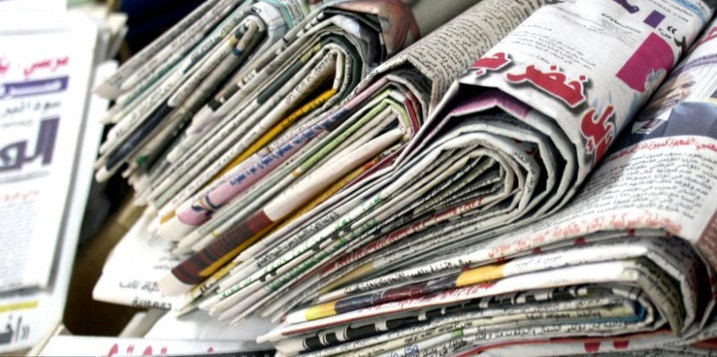Two years of war in Sudan: Journalists urge international action to protect media

Sudanese newspapers (File photo: RD)
On the second anniversary of the war in Sudan, Kamal Elsadig, Editor-in-Chief of Dabanga – Radio TV Online, and other Sudanese journalists have signed a joint opinion piece in Le Monde, calling for international action to protect media workers. Initiated by Reporters Without Borders, the op-ed denounces global media silence and highlights the life-threatening conditions faced by journalists in Sudan and in exile and is timed to coincide with the London Sudan conference being held today.
Below is the full op-ed, as published in Le Monde:
Sudanese journalists call for urgent mobilisation to protect the media amid war
At the initiative of the NGO Reporters Without Borders, a collective of Sudanese journalists denounces, in an opinion piece in Le Monde, the lack of media and political attention given to the war in Sudan. On the occasion of the international humanitarian conference for Sudan and neighbouring countries, they highlight the importance of journalists’ role and demand that measures be put in place for their safety.
The war in Sudan is disappearing from the media radar. Since April 15, 2023, and the beginning of the conflict between the regular army and the Rapid Support Forces, tens of thousands of civilians have lost their lives, and millions have been displaced. But these figures, however terrifying, fail to convey the ongoing humanitarian tragedy.
For two years now, our cameras, our photo equipment, our microphones, and our pens have been threatened, harassed, prevented from giving voice and faces to the victims of the war, prevented from reporting on the famine affecting millions of people, many of whom are trapped by shelling and aerial bombardments in North Darfur. For two years, the country has been sinking into oblivion, not receiving the international political attention that Sudan’s 50 million inhabitants so desperately need.
We, Sudanese journalists, call for an international mobilization to support those who inform you within the country at the risk of their lives, whether on mission in frontline areas or from forced exile.
The conference on the humanitarian crisis in Sudan, organized in London on April 15th to mark the two-year anniversary of the war, at the initiative of the United Kingdom, the European Union, France, and Germany, must lead to concrete commitments for journalism. The Sudanese authorities and the Rapid Support Forces must guarantee reporters independent and secure access to the entire territory, now divided between areas controlled by the regular army and those held by paramilitaries. Faced with rival propaganda that deepens the country’s divisions daily, those who defend the truth wish to lay the foundations for dialogue and reconciliation.
Murders and Detentions
Impunity continues, and the crimes committed by belligerents against media professionals fuel the climate of terror that forces journalists into self-censorship or exile.
After two years of war, at least seven colleagues have been killed because of their work, according to data from Reporters Without Borders. They are journalists from the Sudan National Broadcasting Corporation Issam Hassan Morjan and Sami Abd El-Hafidh; Halima Idris Salim from the independent channel Sudan Bukra; Ahmed Youssef Arabi from Blue Nile Channel television; Khaled Balel, journalist and media director at the Sudanese Supreme Council for Media and Culture; investigative journalist Muawiya Abdel Razek, contributor to the Sudanese online newspapers Al-Jarida, Akhir Lahza, and Al-Akhbar; and cameraman Hatem Maamoun, contributor to Sudania 24. Journalist Abdel Rahman Warab from the Sudanese news agency SUNA is still missing after being abducted from his home in Khartoum in June 2023.
In addition to these murders, at least seventeen of our colleagues are detained. Hassan Hamed, a reporter for Independent Arabia arrested by government forces while reporting in Port Sudan in October 2023, remains behind bars. Since January 2024, the Rapid Support Forces have held audiovisual technician Mamoun Hassan Hamid in an unknown location.
We call for the immediate release of our two colleagues, for an investigation into the disappearance of Abdel Rahman Warab, and demand justice for our colleagues who paid with their lives for their work of informing.
Signatories:
Shawgi Abd-Alazim Al-Amari, editor-in-chief of Istiqsai; Mohamed Abdel Aziz, journalist for Al-Demoqraty; Rasha Awad, editor-in-chief of the online newspaper Al-Taghyeer; Ali El-Dali, correspondent for Al-Horra; Othman Fadlallah, journalist for Ufuq Jdeed; Ahmed El-Taher Gouja, journalist and founder of Darfur Monitors; Mohamed Latif, journalist for Teeba Press; Mohamed Nagi, editor-in-chief of Sudan Tribune; Kamal Elsadig, editor-in-chief of Radio Dabanga; Faysal Mohamed Salih, journalist for Al-Sharq Al-Awsat.











 and then
and then